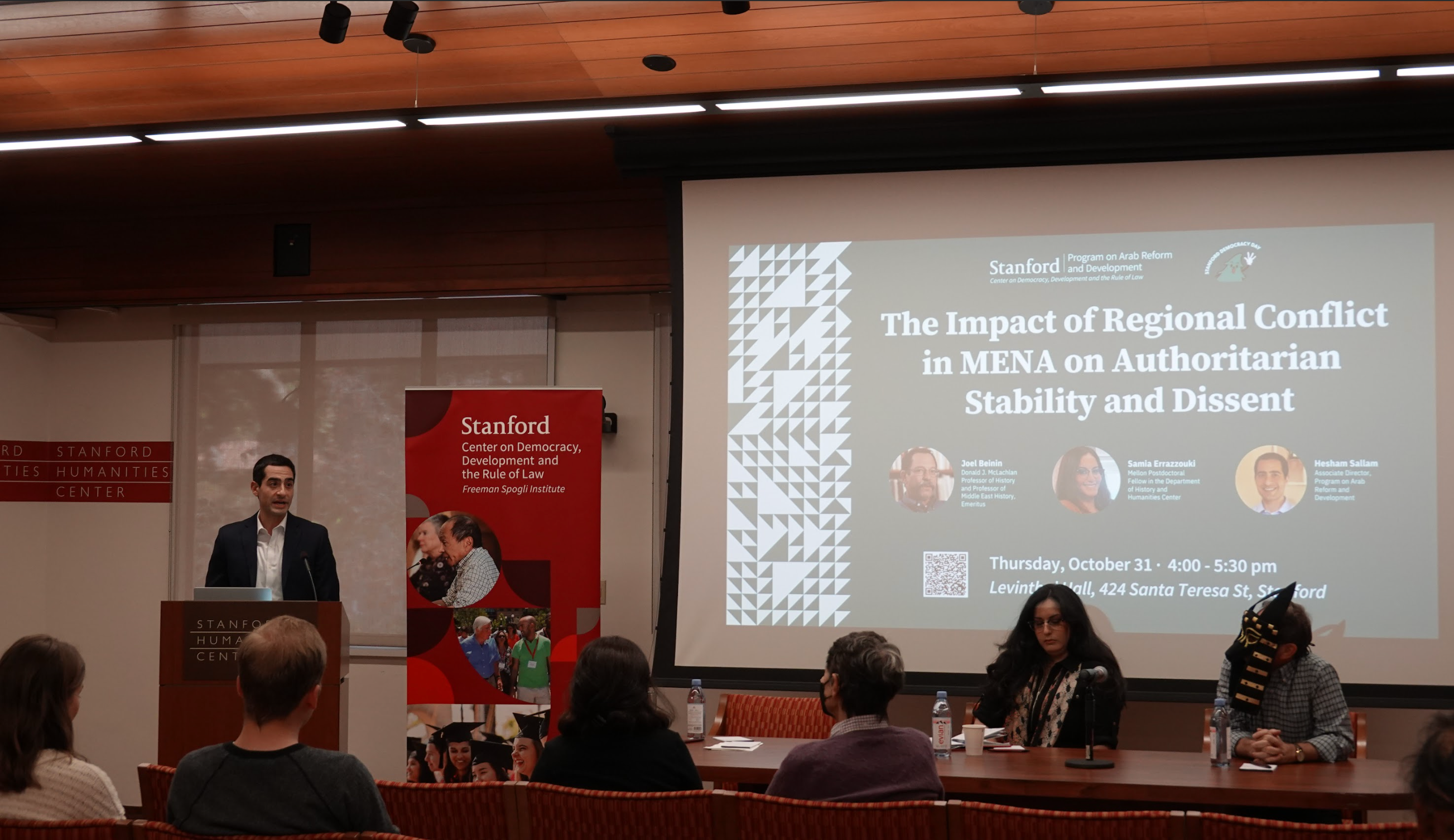Stanford scholars detailed broader historical trends impacting authoritarian stability and dissent in the Middle East and North Africa (MENA) region amid the Israel-Gaza war and Israel’s invasion of Lebanon during a panel discussion Thursday.
Since Hamas’s Oct. 7 attack, Israel has confronted a “clear and immediate democratic emergency,” said Joel Beinin, professor of Middle East history.
“We can’t understand either the assault on democracy since Oct. 7, or the possibility of turning this back in any meaningful way, without understanding that there is a history to this that goes back much further than Oct. 7, 2023,” Beinin said.
Held at the Stanford Humanities Center, the event was co-sponsored by the Center on Democracy, Development and the Rule of Law’s (CDDRL) Program on Arab Reform and Development and Democracy Day. In addition to Beinin, panelists included Samia Errazzouki, postdoctoral fellow in the history department and humanities center, and Hesham Sallam, associate director of the program on Arab reform and development.
Beinin began the discussion by providing historical background on the crisis of Israeli democracy in light of the Israel-Gaza war. He presented media and scholarly perspectives on the basis for Israeli democracy, arguing that the policies of Israel’s current government have led to the erosion of judicial independence and the entrenchment of “Jewish supremacy,” citing laws that discriminate against Palestinian-Arab citizens.
The onset of war has led to an “absolute assault” on citizens expressing opposition to the war or condolences for Palestinian victims of Israel’s military campaign in Gaza, Beinin said, with the country’s long-standing pressures on democratic norms escalating during wartime.
The Basic Laws of Israel, which are composed of fourteen quasi-constitutional laws outlining the relationship between the state and the country’s principal governing authorities, have taken the place of a formal constitution since 1958. Beinin criticized the scope of Israel’s 2018 Basic Law, a legal framework which he said excludes the Palestinian-Arab national minority by establishing that “the right to exercise national self-determination in the State of Israel is unique to the Jewish people” and promoting settlement in the West Bank and the Gaza Strip.
“The [Israeli] state views the development of Jewish settlement as a national value, and will act to encourage and promote its establishment and consolidation,” he said, adding that the spreading of anti-democratic opinions and actions by a significant portion of Israel’s Jewish citizenry has further complicated the question of Israeli democracy.
Turning from Israel to other states, Errazzouki examined the response of Arab authoritarian regimes to expressions of pro-Palestine solidarity following the 1967 Arab-Israeli war and the 2011 Arab Spring.
“What we saw in that aftermath was this brief opening of critical engagement in conversations and debates amongst Arab scholars across the political spectrum and across the region in ways that arguably we haven’t seen since,” Errazzouki said, in reference to both events. However, she argued that this “breath of possibility” was short-lived in both instances given authoritarian resurgence throughout the region 10 years after the events of 1967, and later, 2011.
In 2020, several Arab countries signed normalization deals with Israel known as the Abraham Accords in talks that were brokered by the United States. The bilateral agreements were met with widespread public opposition across the region, according to Sallam.
Whereas Arab regimes had generally permitted statements of pro-Palestine solidarity prior to the accords, the governments have since criminalized criticism of Israel and of the state’s agreements with Israel, Errazzouki said. Countries that were part of the Abraham Accords have also deepened their security ties and relationship with Israel, including by purchasing surveillance software, she said.
“The Palestinian issue, unlike other issues in the region, happens to be one of the few that unites and brings together people across the political spectrum, from as progressive on the left, to as conservative and religious on the right,” Errazzouki said. “I think the possibilities of that coalescing into a movement that could invoke some of the demands of the 2011 Arab Spring are what ultimately concerns these regimes.”
Sallam illuminated the ongoing struggle between Arab public opinion and regional autocracies, underscoring the complexities of regional stability and the enduring influence of the Arab Spring.
In the decade since the uprisings, revolutions and civil conflicts of the Arab Spring, Sallam said that countries such as Saudi Arabia and the United Arab Emirates have collaborated to prevent the spread of political unrest and instability within their borders. These regimes have sought to “leverage their security cooperation with Israel” in order to “enlist U.S. support in [efforts to establish] internal stability” in the wake of the Arab Spring, Sallam said.
“Understanding and studying the impact of the war on Gaza on authoritarian stability and dissent is the kind of endeavor that challenges us to move beyond the headlines… it pushes us to move beyond these short-term developments, and instead take the long view of the past decade,” Sallam said. “We cannot appreciate the importance of the [current] political moment unless we consider the trajectory of the evolution of Arab politics since the onset of the Arab Spring.”
Sallam argued that the resurgence of pro-Palestinian expressions of solidarity since the beginning of the Israel-Gaza conflict has challenged the long-standing efforts of Arab political leaders to impose a normalization framework with Israel, which, Sallam said, “sidelines and marginalizes the question of Palestinian rights, Palestinian self-determination and Palestinian statehood.”
“The conflicts that began in 2010 and 2011 in the wake of the Arab Spring are not irrelevant to the conflicts and politics that are playing out right now region-wide, and Palestine itself is not irrelevant to the struggles that began in 2011,” Sallam said.
He emphasized that the threat to the authoritarian states’ vision of internal stability stems not only from the military, but also from the Arab public.
“It could be that the [region’s armed resistance] could be eliminated, except at the end of the day, that doesn’t change the fact that these countries, these leaders, are still at war with their own people,” Sallam said.
